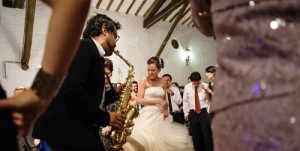More Gregg Wallace than Fred Astaire? Fear not. A few dance lessons are all you need to impress on the dancefloor, as Paul F Cockburn learns.
Your wedding day is punctuated by a few key moments where all eyes are guaranteed to be on you and your new spouse: the ceremony, of course; the cake cutting; and the first dance. You can’t really go far wrong with the first two, bu if we’ve learned anything from YouTube, it’s that the first dance can be a tricky one to navgate for nyone with two left feet. It’s understandable, then, if the prospect of taking to the dancefloor for your first dance – in front of family and friends – inspires genuine trepidation.
Fortunately, dancing is a skill that you can brush up on, and a growing number of couples are taking lessons ahead of the big day to ensure their footwork doesn’t let them down. “The benefits of getting dance lessons prior to the wedding are that you build up confidence and it relieves you of the worry of that first dance,” says dance instructor Gordon Morrison of Edinburgh-based DanceClass.co.uk. “A secondary benefit is that it gives you a skill for life at future weddings, staff dances, partes, and so on.”
STEP TO IT
There’s no hard and fast rule for when you should start and how many dance lessons you’ll need; it depends on a number of things, from how easily you pick steps up to the complexity of the routine you want to learn. “Everybody’s different,” explains Alan Dee, of DeesDancing.co.uk – winner of the Specialist Wedding Supplier Award at the Scottish Wedding Awards 2015. “It could be a couple of lessons. Some people come for a year before their wedding. I would say: don’t leave it to the last minute.” A benefit of starting early, Gordon adds, is that it gives you plenty of time to practice your moves so that all goes smoothly on the day.
Before you go for your first lesson, have a think about the song you’d like to dance to, as this will influence the style of dance you learn. “What couples can do is pick their music, and also have a second choice as well,” suggests Alan. “Their instructor will listen to the music and, first of all, show them some simple steps, and then add things if desired. The dance will also depends on whether they want to dance the whole track themselves or, half-way through, invite the wedding party onto the floor.”
If you’re more sure of the style of dance you’d like to learn than the actual music you’ll be dancing to, your instrcutor will be able to advise you on a suitable song to match the timing of the dance. “The most common slow songs are suitable for a social foxtrot, which is a simplified version of the slow foxtrot proper,” says Gordon. “The social foxtrot is by far the most popular choice and has been for mmany years,” says Morrison. “It covers modern songs such as Sam Smith and going back to Robbie Williams, Take That, and classics by the likes of Frank Sinatra.” There’s no rule saying you have to choose a slow song, however: uptempo numbers can be great fun too!
KEEP IT SIMPLE
Unless you’re an experienced dancer, however, it’s best not to make a big production number of the dance, if only for one reason. “Brides are usually in long gowns that they haven’t worn before, with this volume of material floating around them,” says Alan. “If they do anything too exotic, they may end up on the floor! The dance style has got to suit their wedding dress.”
Going for a routine that’s within your comfort zone is the most sensible option to take, allowing you to elegantly carry off your first dance with ease. “Simple dances or simple figures for dance are far better than complicated figures done out of time,” agrees Gordon – a sentiment that will chime with anyone who’s ever watched an episode of Strictly.
Not convinced that you can do it? Even if you are more Gregg Wallace than Fred Astair, both Gordon and Alan insist that absolutely everyone can be taught how to dance. “If your heart beats, you have rhythm in your body,” maintains Alan. “It’s up to a professional teacher to help show you this. Anybody can learn; the problem is confidence. If you say ‘Oh I can’t do that’ enough times, you’ll convince yourself you can’t, so you’ve got to stop saying that!”
Article first published in Spring 2015 issue of Scottish Wedding Directory.
